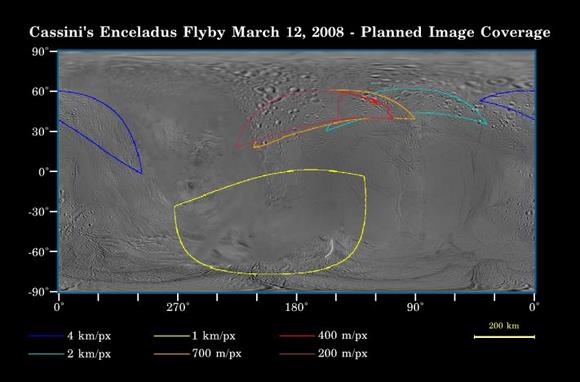The venerable Cassini spacecraft will make an extremely close flyby of Saturn’s moon Enceladus, one of the most intriguing moons in the Saturn system. Earlier flybys by Cassini revealed a geyser-like plume of ice particles shooting up from Enceladus’ south pole region. This means there’s a water source on the moon, and of course, water on another body in our solar system is an intriguing mystery that we want to take a closer look at. And this look will be extremely close. At one point during the flyby, when Cassini is near the equator of Enceladus, the spacecraft will only be about 50 km from the moon’s surface.
Cassini will skim over moon on March 12, at 19:06 UT. When Cassini is near the south pole, however, the spacecraft will be about 200km from Enceladus’ surface– which is probably a good thing. Even a small particle hitting the spacecraft could do a lot of damage, and the scientists say Cassini should be flying well above where any ice particles should be.
Learn more about the flyby in this video that the Jet Propulsion Laboratory put together.
Also, this graphic shows the areas on Enceladus that will be observable to Cassini as it whizzes by. Cassini’s scientists are hoping this flyby will help us understand the interior of this moon and how extensive its water source may be.
Original News Source: Cassini website


WOW!!! Thanks for the news. If this moon has an ocean beneath the ice and there is a path that connects from the surface to the ocean, then we have to send a drone-submarine to explore this moon in the next 10-20 years. This is better than Europa if there exists a straight path to the ocean below the ice cap.
This is the nearest thing cassini will come to that may bring an abrupt end to this very special mission. One takes a look back to when comet haley was visited the craft
was battered Cassini in my opinion is about to crash on the surface and will taste the ice.
It’s intruments if they survive may encounter microbial life
If Europa’s waters turn out to be lifeless at leat there’s still a chance extraterrestrial life in our solar system. Hmm, Enceladian squid rings anyone 😉
If Europa’s waters turn out to be lifeless at least there’s still a chance extraterrestrial life in our solar system. Hmm, Enceladian squid rings anyone 😉
To boldly go where no spacecraft has gone before!
This is a risky plan for a one-of-a-kind spacecraft, so far from home. I hope we survive…
that being said hiro, Europa must be just solid ice, and would be a complete waste of time to explore for life. Enceladus has geysers indicating the presense of heat. Where is all the heat escaping to on europa?